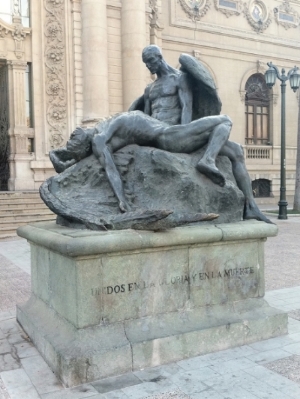Coping with Loss
Demeter learns of her daughter’s abduction to the Underworld through Helios, the Sun God. Homer tells us she is seized with “brutal grief” at the news. Her sorrow is compounded by the knowledge that she cannot access the Underworld to rescue her daughter. Persephone is trapped in the Underworld and cannot escape; Demeter, as the Goddess of the Grain, is restricted to the over world. So mother and daughter can never be reunited.
General View of Sanctuary of Demeter and Kore and the Telesterion (Initiation Hall), Center for the Eleusinian Mysteries, Eleusis;
Uploaded by Marcus Cyron; 6 February 2005, 13:10; Author: Carole Raddato from FRANKFURT, Germany [CC BY-SA 2.0 (http://creativecommons.org/licenses/by-sa/2.0)], via Wikimedia Commons
Demeter’s reaction to this devastating loss is understandable: she avoids dealing with the issue through withdrawal and denial. She disguises herself as an elderly mortal, leaving Olympus and the company of the gods. In other words, she does what many of us do when faced with gut-wrenching loss: she runs away from the problem and runs away from herself by denying her identity. Sometimes the pain of loss can be so overwhelming that we try to flee from it rather than face it.
Demeter manifests another very human trait in dealing with loss. Rather than coping with it, her desperation leads her to seek a substitute by appropriating another woman’s child for herself. Oftentimes when experiencing a loss or a break-up in a relationship, we scramble to find an alternative to ease our pain. We deny ourselves time to adjust to our loss. That Demeter takes a circuitous route before finally coming to terms with her loss suggests our own ability to heal from grief can be a matter of timing: we do so only when we are ready and we may not be ready until we have experienced some detours.
Loss must be acknowledged and accommodated. Each time Demeter joyfully embraces Persephone as she emerges from the Underworld, she is acknowledging there are some losses we can never reverse. She has learned to live with her loss by accepting Persephone for who she has become and not for what she once was. If we ever hope to move beyond our grief, we must do the same.
As the Hymn to Demeter shows us, dealing with grief can be avoided temporarily, but it cannot be avoided indefinitely. A hasty substitute is a short-term solution; denial delays the healing process. Sooner or later, we have to face reality, work through our loss, and embrace it. It is only by doing so will we be able to transcend it and move forward.
Demeter reacts to the injustice of her daughter’s abduction with understandable rage. However, she also manifests an all too frequent and not easily forgivable reaction some people exhibit when faced with oppression. This will be the subject of my next post.


